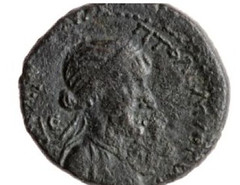
PREV ARTICLE
NEXT ARTICLE
FULL ISSUE
PREV FULL ISSUE
ANTONY AND CLEOPATRA COIN FOUND IN ISRAELI DIG
Arthur Shippee forwarded this article, found via The Explorator newsletter. Thanks!
-Editor
Great rulers come but a rare few leave a mark echoing down the millennia. Two such were Cleopatra and Marc Antony, who fleetingly placed Egypt at the center of the ancient world, only to unleash unrest and eventually war on the region. A few thousand years is a mere blink of an eye when it comes to the vital ties between this land and Egypt, as attested by a rare coin carrying historical weight far greater than its 7.59 grams, which depicts the notorious lovers – and which emerged last year from the ruins of a first-century house at Tel Bethsaida on the Sea of Galilee. Tel Bethsaida rises from the northern coast of the Sea of Galilee, but the coin was minted in another city by another sea – the Mediterranean port of Akko - today better known as Acre. The coin, made of bronze, is about the size of a quarter, being 21–23 millimeters in diameter (it is not perfectly round, at least not any more). Its date shows that it was minted in the last half of the year 35 or the first half of 34 BCE. Mark Antony, the most powerful man in the world at the time, is on one side of the coin and Cleopatra graces the other. On her side are the Greek words “of the people of Ptolemais.” Why depict them? The cities of the ancient Middle East had a habit of minting coins bearing the portraits of whoever was in power, says Dr. Donald T. Ariel, head of the Israel Antiquities Authority Coin Department. Had Antony not lost the battle of Actium in 31 BCE, there might have been a dramatic change in the history of the Western civilization, Arav says. “We can only imagine what could have happened to Western civilization if the capital of the empire was not Rome, but Alexandria," Arav says. "Until Augustus turned it ‘from a mudbrick city to marble’ Rome was a very unimpressive town. It could have remained an unimportant city on an insignificant peninsula of Italy, way in the west, where according to the Greeks, demons and giants lived.” When pressed to imagine what could indeed have happened, Arav, says: “I am not sure that we would be worshipping cats today or building pyramids, but Greek could have been much more important than it was and perhaps the rise of Europe in the 15th century would not have happened. Who knows?” But Antony did lose that battle, and 11 months later, he took his own life, dying in Cleopatra's arms in an immortal star-crossed lovers’ moment.
To read the complete article (registration required), see:
The ancient coin of Cleopatra: There could have been pyramids in Paris
(www.haaretz.com/archaeology/.premium-1.539712)
The Numismatic Bibliomania Society is a non-profit organization promoting numismatic literature. See our web site at coinbooks.org. To submit items for publication in The E-Sylum, write to the Editor at this address: whomren@gmail.com To subscribe go to: https://my.binhost.com/lists/listinfo/esylum All Rights Reserved. NBS Home Page Contact the NBS webmaster 
|
